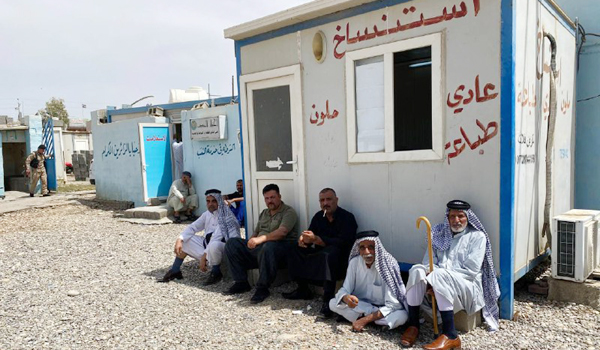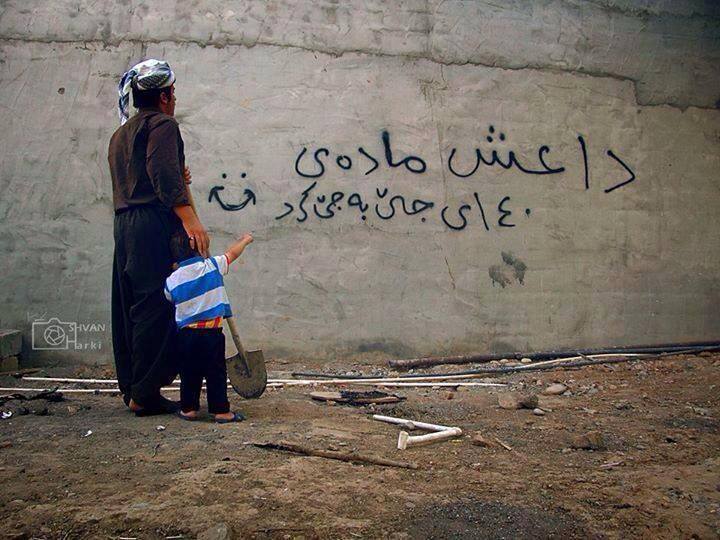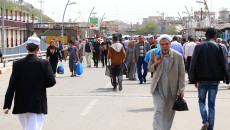Police stations in Khanaqin district are crowded with Arabs from middle and southern province fled Khanaqin 19 years ago to escape retaliation by the Kurds they took their lands.
They have returned to Khanaqin following the control of the disputed territories in Iraq including Khanaqin by the Iraqi security forces ISF, to file lawsuits, seeking compensations for the losses they afflicted following 2003 US war against Iraq.
300 complaints have been registered with the police in Khanaqin in just one month and the process continues. These citizens were settled in Khanaqin villages during the Ba'ath regime as part of the Arabization process, but returned to southern and central Iraq in 2003 when the Ba'ath regime was overthrown and the displaced Kurdish and Turkmen farmers returned to their hometowns and villages.
Jassim Muraid, about 80, was waiting in front of a police station in Khanaqin to file his complaint. “My complaint is against America because they were the reason why I was expelled from Khanaqin in 2003. Now I have come to demand compensation.”
Muraid said he was moved from Wasit province to Baplawi village in Khanaqin district in 1975 by the Ba'ath regime.
“We were settled on Kurdish property. We lived here for 28 years when the US overthrew the Ba'ath regime. We were 30 families who were evicted from the village,” he recalls.
"We left our property and agricultural land, our livestock were confiscated and destroyed. Now we want to be compensated," he added.
According to Article 140 of the Iraqi constitution, each Arab family must file an application and agree to return, in exchange for 20 million dinars ($16,500) will be paid and returned to their place.
Most of those interviewed by KirkukNow were from Diwaniya, Nasiriyah and Wasit provinces and have fled Khanaqin to their home towns in 2003 without filing a complaint.

US-led coalition forces overthrew the Ba'athist regime in Iraq in 2003, forcing thousands of Arab families who had been resettled in the disputed territories, including Khanaqin district in Diyala province, to leave Khanaqin under pressure from Kurdish forces and the displaced.
According to the Iraqi constitution approved by the majority of voters in Iraq, the fate of the disputed territories must be resolved according to a three-stage roadmap, starting with normalization and then the census, to be followed by a local elections or referendum about its destiny to be part of Baghdad or Erbil, according to Article 140 that set the end of 2007 as a deadline for implementing these stages.
"We were settled in Deka Mullah Ibrahim village for 28 years and used our land, but when the Ba'ath Party collapsed, all our property was confiscated," said Ahmad Dashir, an Arab settler, in front of the Azadi police station in Khanaqin.
Deka Mullah Ibrahim village is mainly inhabited by the Kurds. Since 2003, the real Kurdish owners of the land have resumed their houses and farms in the village.
"We suffered a disaster. The US allowed the Kurds to expel us, but we have no complaints against the Kurds and the Peshmerga," Dashir added.
"Either we want compensation or we want to regain the lands in Khanaqin," he said.
In general, the desire to return and calls for compensation by the Arab settlers to Khanaqin and other disputed territories, including Kirkuk, emerged after the end of the war against the Islamic State in Iraq and Syria ISIS and the return of Iraqi forces in late 2017 to the disputed that was under the control of the Kurdistan Regional Government KRG forces since 2003.
According to more than one police source in Khanaqin, who were not authorized to speak to the media, 300 complaints have been filed within a month.
"We have investigated and found that there is a committee to compensate the victims in different provinces and is dedicated to those who were affected at that time, the committee asked for evidence from the families, they come to file the complaint and use it as evidence,” a senior police officer anonymously told KirkukNow.

According to Article 140 of the Iraqi constitution, each Arab family imported to the conflict areas must be paid 20 million dinars as compensation in case of return to their places of origin, with other compensation to be estimated such as the damage caused by the return, for example, damage to water wells, trees and farmss, according to Adnan Mansour, who was in charge of the Khanaqin office of the Article 140 Implementation Committee for 16 years.
Mansour, who stepped down in March, said, "There is no international legal basis for suing the US forces because the United States has declared itself an occupying power in the UN Security Council.”
"According to Article 140 of the constitution, any Arab citizens who were moved to Khanaqin between 1968 and 2003 had two options, either apply for compensation and return them to their places, or stay on the condition that they do not stay on lands of Kurds or any other ethnicity,” Mansour added.
According to the Khanaqin office of the Article 140 Implementation Committee, about 4,000 imported Arab families have been compensated through their office.
"After 2003, most of the imported Arabs fled and left Khanaqin. Most of them did not submit a claim under Article 140 to be compensated.”
The families' attempts to receive compensation under Article 140 come at a time when the 2022 budget has not yet been sent to parliament to determine the share of the article.
The Iraqi Ministry of Finance has allocated only 12.9 billion dinars in 2021 to compensate citizens under Article 140, while only Kirkuk office for the implementation of the article had requested 60 billion dinars.
Thousands of families still have to receive compensation under the normalization of the situation in the conflict provinces – normalization is part of Article 140 of the constitution – although according to the Iraqi constitution, that article should have been implemented on December 31, 2007.
"The situation in determining ownership of properties in the disputed territories is complicated. There are political and legal aspects. The political aspect is weak and nobody takes steps for it. Therefore, attention should be paid to the legal aspect," Mansour said, “and this wouldn't happen now.”
“If this would have been sorted out in 2007, we would never have reached such a condition.”






